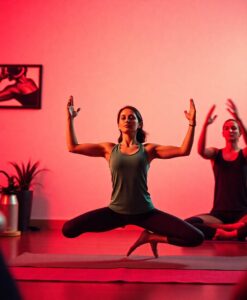Movement is a profound language of human adaptation, and not all practices speak equally to our physiological needs. While yoga offers remarkable advantages in flexibility, mindfulness, and stress reduction, recent scientific investigation reveals nuanced insights into its impact on heart health. Our bodies require varied stimulation to maintain optimal vascular resilience.

Understanding these research findings invites us to approach wellness with curiosity and openness. The conversation isn’t about dismissing yoga, but expanding our perspective on comprehensive physical health. How might we integrate different movement practices to support our cardiovascular system’s complex needs? This emerging research opens fascinating questions about how we cultivate whole-body vitality across diverse approaches to physical activity.
A comprehensive review shows that yoga doesn’t match up to traditional exercise for improving vascular health. Activities like Pilates, Tai Chi, and interval training prove more effective in keeping arteries resilient, especially in sedentary adults. While yoga remains valuable for accessibility and cultural significance, experts say it should be supplemented with more vigorous activity to fully protect heart health.


